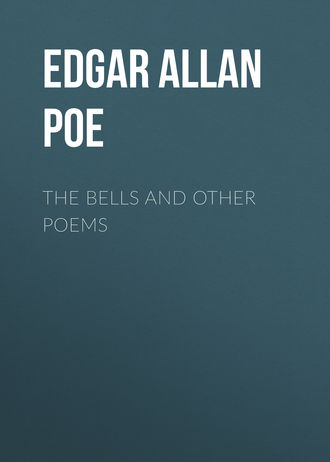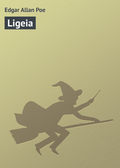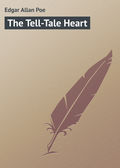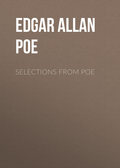полная версия

Эдгар Аллан По
The Bells and Other Poems
Than ev'n thy glowing bosom beats withal,
And when old Time my wing did disenthral
Thence sprang I – as the eagle from his tower,
And years I left behind me in an hour.
What time upon her airy bounds I hung,
One half the garden of her globe was flung
Unrolling as a chart unto my view —
Tenantless cities of the desert too!
Ianthe, beauty crowded on me then,
And half I wish'd to be again of men."
"My Angelo! and why of them to be?
A brighter dwelling place is here for thee —
And greener fields than in yon world above,
And woman's loveliness – and passionate love."
"But, list, Ianthe! when the air so soft
Fail'd, as my pennon'd spirit leapt aloft,
Perhaps my brain grew dizzy – but the world
I left so late was into chaos hurl'd —
Sprang from her station, on the winds apart,
And roll'd, a flame, the fiery Heaven athwart.
Methought, my sweet one, then I ceased to soar
And fell – not swiftly as I rose before,
But with a downward, tremulous motion thro'
Light, brazen rays, this golden star unto!
Nor long the measure of my falling hours,
For nearest of all stars was thine to ours —
Dread star! that came, amid a night of mirth,
A red Daedalion on the timid Earth."
"We came – and to thy Earth – but not to us
Be given our lady's bidding to discuss:
We came, my love; around, above, below,
Gay fire-fly of the night we come and go,
Nor ask a reason save the angel-nod
She grants to us, as granted by her God —
But, Angelo, than thine grey Time unfurl'd
Never his fairy wing o'er fairier world!
Dim was its little disk, and angel eyes
Alone could see the phantom in the skies,
When first Al Aaraaf knew her course to be
Headlong thitherward o'er the starry sea —
But when its glory swell'd upon the sky,
As glowing Beauty's bust beneath man's eye,
We paused before the heritage of men,
And thy star trembled – as doth Beauty then!"
Thus, in discourse, the lovers whiled away
The night that waned and waned and brought no day.
They fell: for Heaven to them no hope imparts
Who hear not for the beating of their hearts.
TO F – S S. O – D
[Mrs. Frances Sargent Osgood]
Thou wouldst be loved? – then let thy heart
From its present pathway part not!
Being everything which now thou art,
Be nothing which thou art not.
So with the world thy gentle ways,
Thy grace, thy more than beauty,
Shall be an endless theme of praise,
And love – a simple duty.
BRIDAL BALLAD
The ring is on my hand.
And the wreath is on my brow;
Satin and jewels grand
Are all at my command,
And I am happy now.
And my lord he loves me well;
But, when first he breathed his vow,
I felt my bosom swell —
For the words rang as a knell,
And the voice seemed his who fell
In the battle down the dell,
And who is happy now.
But he spoke to re-assure me,
And he kissed my pallid brow,
While a reverie came o'er me,
And to the church-yard bore me,
And I sighed to him before me,
Thinking him dead D'Elormie,
"Oh, I am happy now!"
And thus the words were spoken,
And this the plighted vow,
And, though my faith be broken,
And, though my heart be broken,
Here is a ring, as token
That I am happy now!
Would God I could awaken!
For I dream I know not how!
And my soul is sorely shaken
Lest an evil step be taken, —
Lest the dead who is forsaken
May not be happy now.
TO MY MOTHER
[His Mother-in-law, Mrs. Clemm.]
Because I feel that, in the Heavens above,
The angels, whispering to one another,
Can find, among their burning terms of love,
None so devotional as that of "Mother,"
Therefore by that dear name I long have called you —
You who are more than mother unto me,
And fill my heart of hearts, where Death installed you
In setting my Virginia's spirit free.
My mother – my own mother, who died early,
Was but the mother of myself; but you
Are mother to the one I loved so dearly,
And thus are dearer than the mother I knew
By that infinity with which my wife
Was dearer to my soul than its soul-life.
TO HELEN
["Helen" was Mrs. Stannard, whose death also inspired Lenore.]
Helen, thy beauty is to me
Like those Nicean barks of yore,
That gently, o'er a perfumed sea,
The weary, wayworn wanderer bore
To his own native shore.
On desperate seas long wont to roam,
Thy hyacinth hair, thy classic face,
Thy Naiad airs have brought me home
To the glory that was Greece,
And the grandeur that was Rome.
Lo! in yon brilliant window-niche
How statue-like I see thee stand,
The agate lamp within thy hand!
Ah, Psyche, from the regions which
Are Holy Land!
THE VALLEY OF UNREST
Once it smiled a silent dell
Where the people did not dwell;
They had gone unto the wars,
Trusting to the mild-eyed stars,
Nightly, from their azure towers,
To keep watch above the flowers,
In the midst of which all day
The red sunlight lazily lay.
Now each visitor shall confess
The sad valley's restlessness.
Nothing there is motionless —
Nothing save the airs that brood
Over the magic solitude.
Ah, by no wind are stirred those trees
That palpitate like the chill seas
Around the misty Hebrides!
Ah, by no wind those clouds are driven
That rustle through the unquiet Heaven
Uneasily, from morn till even,
Over the violets there that lie
In myriad types of the human eye —
Over the lilies there that wave
And weep above a nameless grave!
They wave: – from out their fragrant tops
Eternal dews come down in drops.
They weep: – from off their delicate stems
Perennial tears descend in gems.
THE LAKE – TO —
In spring of youth it was my lot
To haunt of the wide world a spot
The which I could not love the less —
So lovely was the loneliness
Of a wild lake, with black rock bound,
And the tall pines that towered around.
But when the Night had thrown her pall
Upon that spot, as upon all,
And the mystic wind went by
Murmuring in melody —
Then – ah then I would awake
To the terror of the lone lake
Yet that terror was not fright,
But a tremulous delight —
A feeling not the jewelled mine
Could teach or bribe me to define —
Nor Love – although the Love were thine.
Death was in that poisonous wave,
And in its gulf a fitting grave
For him who thence could solace bring
To his lone imagining —
Whose solitary sole could make
An Eden of that dim lake.
THE HAPPIEST DAY, THE HAPPIEST HOUR
The happiest day – the happiest hour
My sear'd and blighted heart hath known,
The highest hope of pride and power,
I feel hath flown.
Of power! said I? yes! such I ween;
But they have vanish'd long, alas!
The visions of my youth have been —
But let them pass.
And, pride, what have I now with thee?
Another brow may even inherit
The venom thou hast pour'd on me —
Be still, my spirit!
The happiest day – the happiest hour
Mine eyes shall see – have ever seen,
The brightest glance of pride and power,
I feel – have been:
But were that hope of pride and power
Now offer'd, with the pain
Even then I felt – that brightest hour
I would not live again:
For on its wing was dark alloy,
And, as it flutter'd – fell
An essence – powerful to destroy
A soul that knew it well.
CATHOLIC HYMN
At morn – at noon – at twilight dim —
Maria! thou hast heard my hymn!
In joy and woe – in good and ill —
Mother of God, be with me still!
When the hours flew brightly by,
And not a cloud obscured the sky,
My soul, lest it should truant be,
Thy grace did guide to thine and thee;
Now, when storms of Fate o'ercast
Darkly my Present and my Past,
Let my Future radiant shine
With sweet hopes of thee and thine!
TO —
[Mrs. Marie Louise Shew.]
Not long ago, the writer of these lines,
In the mad pride of intellectuality,
Maintained "the power of words" – denied that ever
A thought arose within the human brain
Beyond the utterance of the human tongue:
And now, as if in mockery of that boast,
Two words – two foreign soft dissyllables —
Italian tones, made only to be murmured
By angels dreaming in the moonlit "dew
That hangs like chains of pearl on Hermon hill,"
Have stirred from out the abysses of his heart,
Unthought-like thoughts that are the souls of thought,
Richer, far wilder, far diviner visions
Than even seraph harper, Israfel,
(Who has "the sweetest voice of all God's creatures,")
Could hope to utter. And I! my spells are broken.
The pen falls powerless from my shivering hand.
With thy dear name as text, though bidden by thee,
I cannot write – I cannot speak or think —
Alas, I cannot feel; for 'tis not feeling,
This standing motionless upon the golden
Threshold of the wide-open gate of dreams.
Gazing, entranced, adown the gorgeous vista,
And thrilling as I see, upon the right,
Upon the left, and all the way along,
Amid empurpled vapours, far away
To where the prospect terminates —thee only.
EVENING STAR
'Twas noontide of summer,
And mid-time of night;
And stars in their orbits,
Shone pale, thro' the light
Of the brighter, cold moon,
'Mid planets her slaves,
Herself in the Heavens,
Her beam on the waves.
I gazed awhile
On her cold smile;
Too cold – too cold for me —
There pass'd, as a shroud,
A fleecy cloud,
And I turn'd away to thee,
Proud Evening Star,
In thy glory afar,
And dearer thy beam shall be;
For joy to my heart
Is the proud part
Thou bearest in Heaven at night,
And more I admire
Thy distant fire,
Than that colder, lowly light.
STANZAS
How often we forget all time, when lone
Admiring Nature's universal throne;
Her woods – her wilds – her mountains – the intense
Reply of hers to our intelligence!
[Byron, The Island.]
1
In youth have I known one with whom the Earth
In secret communing held – as he with it,
In daylight, and in beauty from his birth:
Whose fervid, flickering torch of life was lit
From the sun and stars, whence he had drawn forth
A passionate light – such for his spirit was fit —
And yet that spirit knew not, in the hour
Of its own fervour – what had o'er it power.
2
Perhaps it may be that my mind is wrought
To a fever by the moonbeam that hangs o'er,
But I will half believe that wild light fraught
With more of sovereignty than ancient lore
Hath ever told – or is it of a thought
The unembodied essence, and no more
That with a quickening spell doth o'er us pass
As dew of the night-time o'er the summer grass?
3
Doth o'er us pass, when, as th' expanding eye
To the loved object – so the tear to the lid
Will start, which lately slept in apathy?
And yet it need not be – (that object) hid
From us in life – but common – which doth lie
Each hour before us – but then only, bid
With a strange sound, as of a harp-string broken,
To awake us – 'Tis a symbol and a token
4
Of what in other worlds shall be – and given
In beauty by our God, to those alone
Who otherwise would fall from life and Heaven
Drawn by their heart's passion, and that tone,
That high tone of the spirit which hath striven
Tho' not with Faith – with godliness – whose throne
With desperate energy 't hath beaten down;
Wearing its own deep feeling as a crown.





